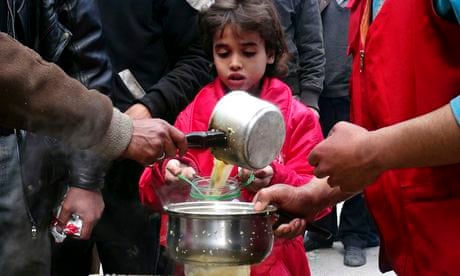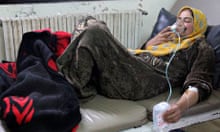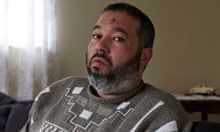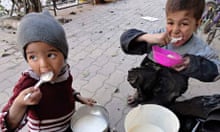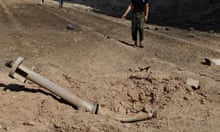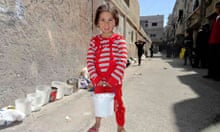The routine has become familiar. An approaching whump of rotor blades, then the piercing plummet of a giant bomb as it shreds the sky above.
The few who have stayed behind in east Aleppo know exactly what to do. "We run to the basement and we stay still, very still," said Mahmoud al-Duri, a resident of the city's ancient heart. "Then we wait." For the past three months, large rudimentary explosives have rained down on the battered city's eastern half day and night, destroying much of what lay beneath and forcing most remaining residents to flee with their families.
The bombing campaign, the most brutal and relentless to have been launched anywhere in the country since the war began, has laid waste to the opposition stronghold in Syria's largest city. Activists and military officials say that 60% of the eastern half has been destroyed in recent months. Damage until then had been sparse.
From just across the frontline it would be difficult to know. Held by President Bashar al-Assad's regime, west Aleppo has neither the look nor feel of a city at war, its residents say. Life goes on there without deprivation or destruction from above. Food and water is plentiful and electricity, which for more than one year in the east has been a fleeting gift, is nearly always on.
More than three years into Syria's civil war, the country is split into the "haves and the have nots". Those who live in areas controlled by the state are not going without. Residents of opposition areas, however, are in an increasingly desperate battle for survival.
In opposition-controlled areas of Homs, more than 200km (124 miles) to the south, and in Damascus the scourge is not bombs but starvation. Food, which is not in short supply in most areas of the country, is desperately needed, especially in districts where rebel groups and anti-regime communities hold out.
The Old City of Homs and the Yarmouk Palestinian refugee camp in the capital are two such areas that are close to being starved into submission. The United Nations Relief Works Agency says its efforts to feed the 18,000 Palestinians who have stayed in the camp, which 18 months ago was home to more than 250,000 people, are close to failing catastrophically. Residents already eating leaves and animal fodder to survive have for the past 10 days been denied access to essential food supplies. If they are not delivered by today, there will be no food in Yarmouk.
Implicit in their suffering is a choice: those who want to eat can leave for the government-held side, but to do so involves the risk of detention. "I have three sons, they were desperate to leave the camp by any means," Abu Issa, 60, told the Observer. "But they were arrested at the first checkpoint and I know nothing about them, if they're dead or alive."
A new UN report has chronicled efforts to get food to those in need since a security council resolution passed in February demanded humanitarian access to suffering communities. The report, obtained by Foreign Policy magazine, found that, while those able to be reached had risen from 3.7 million to 4.1 million, the increase was caused by more people crossing to regime-controlled areas where the Syrian authorities allowed delivery.
In opposition districts of Homs, which have been under relentless attack since the start of the year, activists and aid officials report a similar story of food in return for submission. In Damascus and Hama, locally brokered ceasefires have at times taken on the feel of surrender. Food has been allowed into areas that have agreed to hand over weapons and raise the Syrian flag. Tired, desperate and war-weary communities have complied, their will to fight having ebbed by constantly going without.
On battlefields across the country, the regime's tactics are working. Turning eastern Aleppo into Leningrad has allowed its forces, led by Iraqi paramilitaries and Hezbollah, to advance around the city's eastern edge. This while the opposition had been battling the enemy within – a virulent, al-Qaida-inspired group, the Islamic State in Iraq and Syria (Isis), which has tried to turn the fight to oust Assad into a push to re-establish a caliphate.
In recent weeks the opposition groups have managed to remove Isis from the Idlib and Aleppo countryside. But the price has been immense, with more than 2,000 fighters killed and a power vacuum left behind that local warlords, bandits and opportunists are filling. Looting is now rampant in eastern Aleppo, and the under-equipped local police can do little about it.
"What can we do? We are military police," said one officer on Saturday. "We can't save the whole city. The people in Aleppo don't come to us when they see a house being robbed. Only if it is theirs. We just don't have the numbers to chase them."
Ahmed Fatoul, 30, from the Myessa suburb on the eastern edges, said he was trapped in his house by a constant barrage of high-explosive bombs and the menace of lawlessness.
"I can't leave for Turkey because I don't have enough money," he said. "I cannot make money there. I have three children, how can I provide for them? The best thing for me is to stay in my home. We will die here.
"Yes, I am scared, but there are lots of gangsters in the street. They rob the houses at night."
Mohammed al-Ahmed, 65, said: "My son was killed by an airplane three days ago. He was a taxi driver. He was killed and the car was destroyed. He had 20,000 lira in his pocket. I can't leave his seven children. I can't leave my country. We are in God's hands. And that has been the way since this started."
Those who remain in eastern Aleppo hunker down under candlelight, drawing water from a mosque well. The war is slowly picking them off. "Every day I have 30 to 40 people injured and so many bodies," said a doctor at a nearby hospital. "We do what we can here and we send the rest to Turkey. We don't have enough doctors or staff."
Many of those now fighting the war in Aleppo and Homs say they are travelling to the frontlines with a sense of resignation. "The war isn't yet lost," said a commander of the Liwa al-Tawheed militia, which was battered during the fight with Isis. "But it is on life support."
Once a power player in the north's most powerful opposition unit, the commander is now wary of roads weaving through rural Aleppo that can no longer offer safe passage. Morale among his men has slipped with his authority, as an already fractured opposition splinters under new strains. "But while it is difficult, the regime can't win either," he said. "This is the tragedy. Any victory by either side from here will be a false one. The price is too high."
Farther to the east on the Mediterranean coast, Syria's political opposition leader, Ahmed Jabbar, made a rare foray into a battle zone last week to laud advances made by opposition groups towards Latakia. The groups seized the Armenian Christian town of Kasab. Those responsible included Jabhat al-Nusra and unaligned foreign fighters, Syrians were few among them. Days later, many seem to be questioning the strategy of taking a town that does little to advance the opposition's interest.
"They are claiming any victory they can," said a member of the Syrian Martyrs battalion, comprised only of Syrian nationals. "This is what the war has become."
Additional reporting by Saalim Rizk
